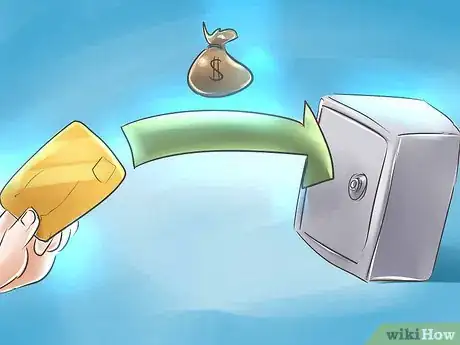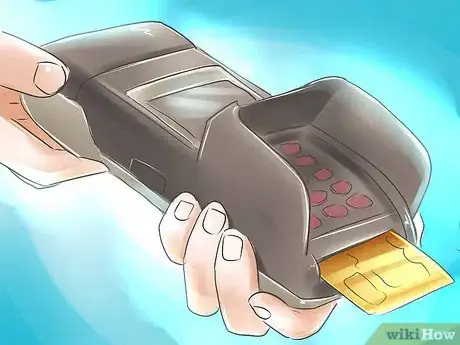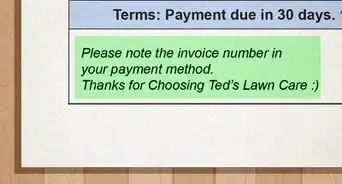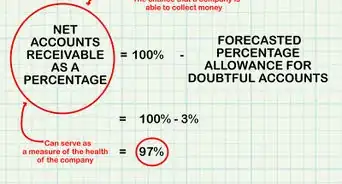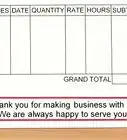This article was co-authored by Gina D'Amore. Gina D'Amore is a Financial Accountant and the Founder of Love's Accounting. With 12 years of experience, Gina specializes in working with smaller companies in every area of accounting, including economics and human resources. She holds a Bachelor's Degree in Economics from Manhattanville College and a Bookkeeping Certificate from MiraCosta College.
wikiHow marks an article as reader-approved once it receives enough positive feedback. In this case, several readers have written to tell us that this article was helpful to them, earning it our reader-approved status.
This article has been viewed 250,323 times.
Running a successful business—–especially an online business—–means being able to process credit cards. However, finding the best solution can be difficult. This article examines the different types of credit card processing solutions and offer a good list of resources for reference as you search for a credit card processing provider.
Steps
Getting Set Up
-
1Set up a gateway account. This is your doorway to digital commerce. There are a number to choose from, but look for the following features:
- PCI DSS Compliant. This ensures that the gateway meets the requirements for Payment Card Industry Data Security Standard.[1]
- SSL (Secure Socket Layer) to ensure that the transactions are protected. Any reputable gateway service will have this.[2]
- Has full eCommerce integration, including shopping carts, email receipts, and support for recurring payments. This will enable you to sell your goods online as well as at your store, should you opt to go that route.
- Report generation. This allows you to track sales and trends.
- Rapid customer support. Whether it's by phone or by an online chat, you want to be able to resolve problems fast.
- Some popular gateway service providers include:
- Flagship Merchant Services
- Intuit Merchant Services
- Authorize.net
-
2Set up a merchant account. Some of the gateway service providers include merchant services, but you can shop around and find the best fit for you.[3] Here are the features to look for:
- Digital application and setup time. When it's time to go into business, you want to get started as soon as you can, with the least amount of paperwork and hassle. Most applications take one to two days to process.
- Monthly fees and transactions fees. Merchant services make their money with every transaction. The percentage differences may be small, but if expect to do a significant number of transactions, those little differences can really add up.
- Credit card swiper. This is necessary for P.O.S. transactions. (In some cases, this is now possible using smartphones.)
- Virtual terminal. This is necessary for online transactions.
- Shopping carts. In order to sell products on an e-commerce site some credit card processing companies require you to have their shopping cart on their website.
- Payment gateway. Do they have a gateway service of their own, or have a partnership? The top merchant account providers all have links with Authorize.net.
- Fraud protection. They should have address verification, SSL, and CVV—that 3-digit number on the back of credit cards.
- Some popular gateway service providers include:
- Flagship Merchant Services
- Merchant Warehouse
- National Bankcard.
Understanding Credit Card Processing
-
1Understand the system. Credit card processing provides for the secure transfer of funds from a card holder's bank account to a merchant account in payment for goods and services rendered.[4]
-
2To make this happen efficiently, the transactions are channeled through a payment gateway.[5] A payment gateway is a service that verifies and authorizes all payments to merchant accounts. This includes traditional brick-and-mortar operations as well as online sales transactions. Here are the steps involved:
- The customer pays. Goods or services are bought with a credit card. This is the beginning of the process.
- Authorization is checked. The payment gateway service sends the transactional data to the merchant bank's processor, who, in turn, routes the transaction data to the cardholder's bank.
- The transaction is verified. The cardholder's bank will either approve or decline the transaction, and then passes that information back to the credit card processor, who, in turn, passes the information to the cardholder and the merchant.
- Goods are delivered. Given a card that was accepted, the merchant delivers the goods to the cardholder.
- The transaction is completed. The customer's bank sends the required funds to the credit card processing network, who forwards the funds to the merchant's bank, and the transaction is settled.
Making Your Choice
-
1Balance cost with reliability. When shopping for credit card processing, you'll quickly realize that rates and fees can vary greatly from company to company. It is always a good idea to get a half a dozen quotes before choosing a provider. That said, while looking for competitive rates, it is always best to make sure the credit card processor you intend to choose can support your business needs.
- Test out the credit card processor's customer and technical support lines before agreeing to use them permanently.
- Call them several times at various times of the day through the week.
- See how long you wait on hold before someone answers your call, or see if you are forwarded to an answering machine. It doesn't matter if your services are the least expensive around––if your solution goes down, you have a lineup of customers wanting to pay, and you cannot get a hold of technical support to assist you.
- Test out the credit card processor's customer and technical support lines before agreeing to use them permanently.
-
2Read the fine print. Be careful before committing to an agreement with a credit card processor, particularly as most agreements are for at least three years and come with some heavy early termination fees.[6] Ask for references and testimonials.
Community Q&A
-
QuestionIf a client will be making ten transactions a month with a credit card, what are the best terms for the credit card processing?
 Community AnswerWhat are the volumes? Credit card processing tends to decrease in costs as the volume increases.
Community AnswerWhat are the volumes? Credit card processing tends to decrease in costs as the volume increases. -
QuestionHow long does it take before we can start accepting credit cards?
 Community AnswerThe process typically takes roughly a week for a merchant account provider, and is nearly instant for an aggregator.
Community AnswerThe process typically takes roughly a week for a merchant account provider, and is nearly instant for an aggregator.
Warnings
- Be sure to know when your agreement is up and mark it in your calendar, because most agreements auto renew for another 3 years if you do not write your credit card processor with 30-60 days notice that you will be canceling.⧼thumbs_response⧽
- Look at the overall agreement, not just the discount rates and transaction fees. Some credit card processors like to display their low rates up front, yet pad the back end administration with tons of hidden fees that usually more than make up for lower than normal discount rates. If it seems too good to be true, then it warrants closer inspection.[7]⧼thumbs_response⧽
References
- ↑ https://www.pcicomplianceguide.org/faq/
- ↑ https://www.digicert.com/ssl/
- ↑ https://paysimple.com/blog/how-to-set-up-a-merchant-account/
- ↑ https://www.valuepenguin.com/credit-card-processing/how-credit-card-processing-works
- ↑ https://ecommerce-platforms.com/ecommerce-selling-advice/what-is-difference-between-a-payment-gateway-payment-processor-and-a-merchant-account
- ↑ https://www.shopify.com/blog/4378162-4-serious-mistakes-business-owners-make-with-their-credit-card-processor
- ↑ https://www.shopify.com/blog/4378162-4-serious-mistakes-business-owners-make-with-their-credit-card-processor


